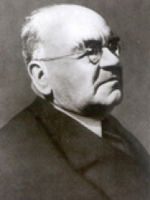
1927 Nobel Prize in Chemistry
Heinrich Otto Wieland (*1877 – †1957) received the Nobel Prize for his research on the constitution of the bile acids and related substances.
Heinrich Wieland was born in Pforzheim and studied chemistry in Munich, Berlin, and Stuttgart. In 1901 he received his PhD at Adolf von Baeyer’s renowned State Laboratory, where he remained for several years as a young scientist. In 1917 he received a full professorship at the Technical College in Munich, and in 1921 he was offered a chair in Freiburg. During his four years in Freiburg, which he referred to as “some of the most pleasant in my scientific career,” he laid the foundation for his Nobel Prize–winning clarification of the constitution of the bile acids, the most important natural product class of steroids, which includes cholesterol and vitamin D (A. Windaus), the sex hormones (A. Butenandt), and the synthetic contraceptive substances.
In 1925 Wieland was offered the prestigious Liebig-Baeyer Chair in Munich as the successor to Richard Willstätter and remained there for 27 years. His astoundingly diverse scientific work, documented in approximately 400 publications, focused on the natural product classes of the alkaloids, the discovery of the biologically important pterins, the first free nitrogen radicals, and last but not least on biological oxidation. His work on this last subject earned him the status as one of the fathers of biochemistry. He was one of the most important chemists of his time.
Wieland was a strict and principled opponent of National Socialism. He employed Jews and supporters of the White Rose resistance movement in his laboratory and even defended them in court.







